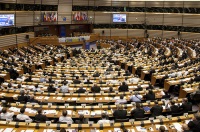Yesterday the Open Rights Group held its final European Parliament hustings at Shoreditch Village Hall in Hoxton, London. It’s been a while since I visited and it’s certainly cleaned up well. It was great to be there. On the way in, I met Claude Moraes, Labour’s spokesman who told me that the Tories non-attendance was deliberate policy. I don’t know if it’s shame at their behaviour on the lobbying around the data protection directive or fear of a digitally educated audience. The meeting was moderated by Glyn Moody, who led the meeting through the issues of privacy, surveillance, whistle blowing, net neutrality, lobbying and copyright reform. The Tories absence meant that representatives from Labour, the LibDems, both represented by incumbents Claude Moraes and Sarah Ludford,the Greens (Danny Bates) and UKIP (Paul Oakley) who were not, were present. …






